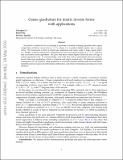Gauss quadrature for matrix inverse forms with applications
Author(s)
Li, Chengtao; Sra, Suvrit; Jegelka, Stefanie Sabrina
DownloadJegelka_Gauss quadrature.pdf (374.4Kb)
OPEN_ACCESS_POLICY
Open Access Policy
Creative Commons Attribution-Noncommercial-Share Alike
Terms of use
Metadata
Show full item recordAbstract
We present a framework for accelerating a spectrum of machine learning algorithms that require computation of bilinear inverse forms u[superscript T] A[superscript −1]u, where A is a positive definite matrix and u a given
vector. Our framework is built on Gauss-type quadrature and easily scales to large, sparse matrices. Further, it allows retrospective computation of lower and upper bounds on u[superscript T] > A[superscript −1]u, which in
turn accelerates several algorithms. We prove that these bounds tighten iteratively and converge at a linear (geometric) rate. To our knowledge, ours is the first work to demonstrate these key properties of Gauss-type quadrature, which is a classical and deeply studied topic. We illustrate empirical consequences of our results by using quadrature to accelerate machine learning tasks involving determinantal point processes and submodular optimization, and observe tremendous speedups in several
instances.
Date issued
2016-06Department
Massachusetts Institute of Technology. Department of Electrical Engineering and Computer Science; Massachusetts Institute of Technology. Laboratory for Information and Decision SystemsJournal
International Conference on Machine Learning
Publisher
Proceedings of Machine Learning Research
Citation
Li, Chengtao, Suvrit Sra, and Stefanie Jegelka. "Gauss quadrature for matrix inverse forms with applications." International Conference on Machine Learning, 20-22 June 2016, New York, New York, PMLR, 2016.
Version: Original manuscript